May 28, 2024 By Bilal Arshad 12 minutes read
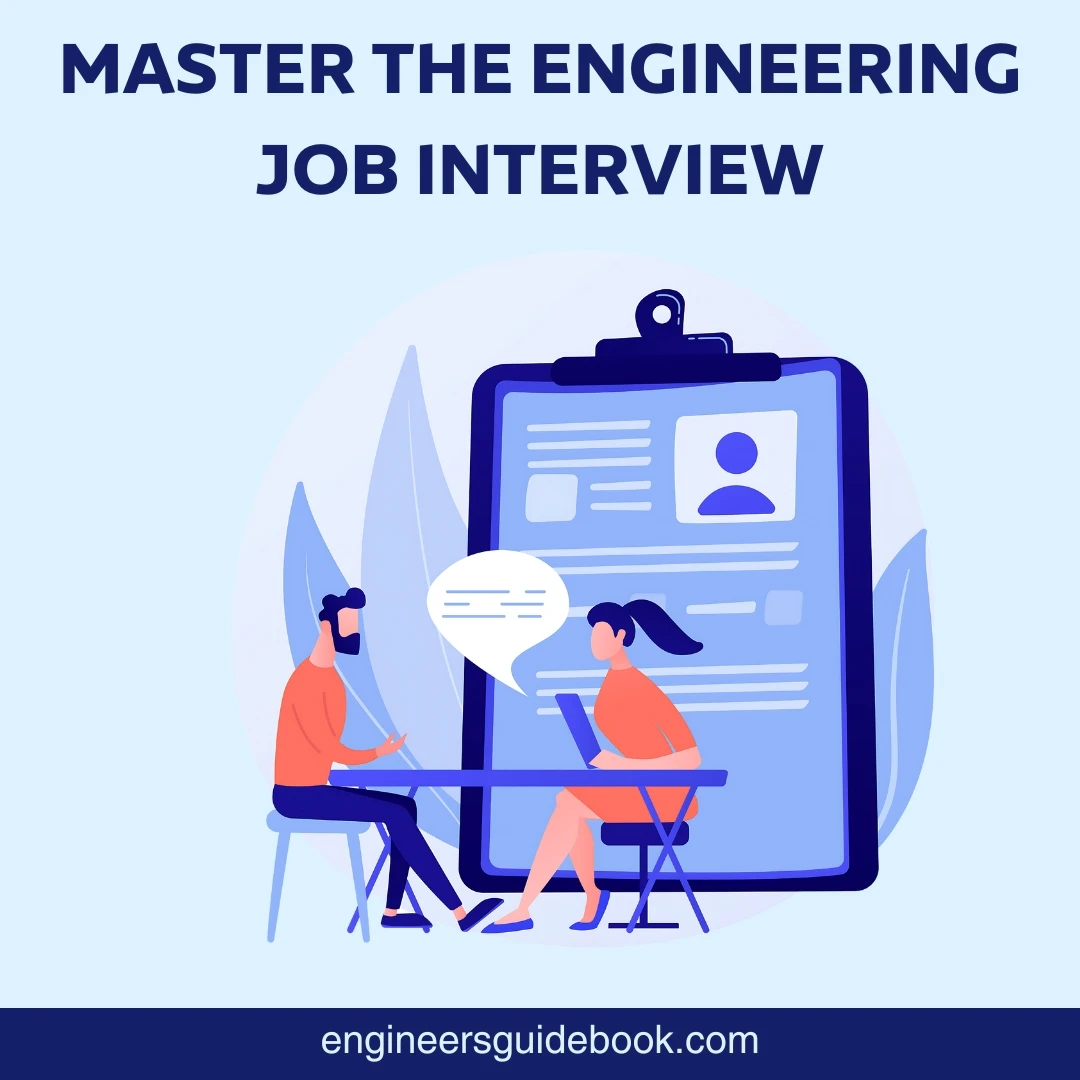
Preparing for engineering job interviews is very important. It helps you show your best skills and knowledge to get the job you want.
When you prepare well, you feel more confident and can answer questions better. This guide will help you understand what to do before, during, and after an engineering job interview.
You will learn how to research the company, practice common interview questions, and make a good impression. By following these steps, you will be able to show your strengths and fit for the role.
This guide is for professional engineers who want to move ahead in their careers. Whether you are looking for a new job. With the right preparation, you can stand out from other candidates and show why you are the best choice for the job.
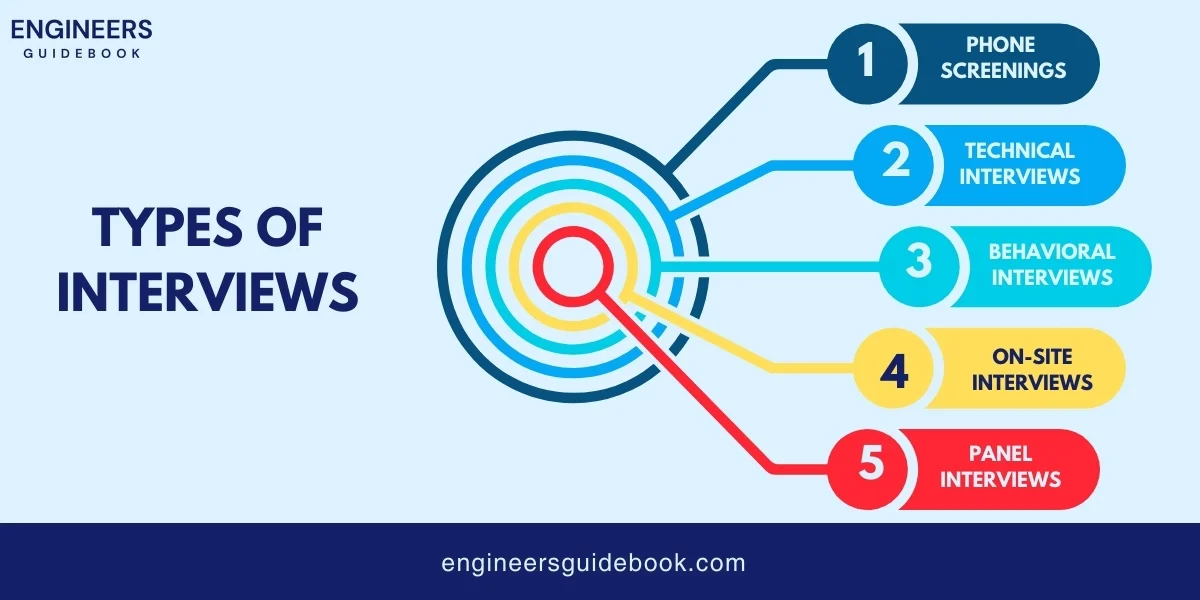
A phone screening is usually the first step. The company calls you to ask basic questions. They want to know about your background and skills. This short interview helps you decide if you should move to the next step.
In a technical interview, you answer engineering questions and solve problems. They test your knowledge and skills. You might have to write code, solve math problems, or explain how things work.
A behavioral interview focuses on how you act in different situations. They ask questions about past experiences. You need to explain how you handled problems, worked in teams, or led projects.
An on-site interview is when you go to the company’s office. You meet the team and see where you might work. You might have several interviews in one day. They test your technical skills and see if you fit in with the team.
In a panel interview, you meet with several people at the same time. They ask you questions one by one. This can be tricky, but it shows how well you handle pressure and different personalities.
Employers want to know if you have the right technical skills for the job. They look for knowledge in areas like coding, math, and engineering principles. Show them you can use the tools and techniques needed for the job.
Your ability to solve problems is very important. Employers want to see how you approach challenges and find solutions. They may ask you to solve problems on the spot to test your thinking process and creativity.
Employers want to know if you will fit into their company culture. This means sharing the same values and working well with the team. Show them you can work well with others and contribute to a positive work environment.
Good communication skills are essential. Employers need to see that you can explain your ideas clearly and listen to others. Show that you can communicate effectively, both in writing and speaking.
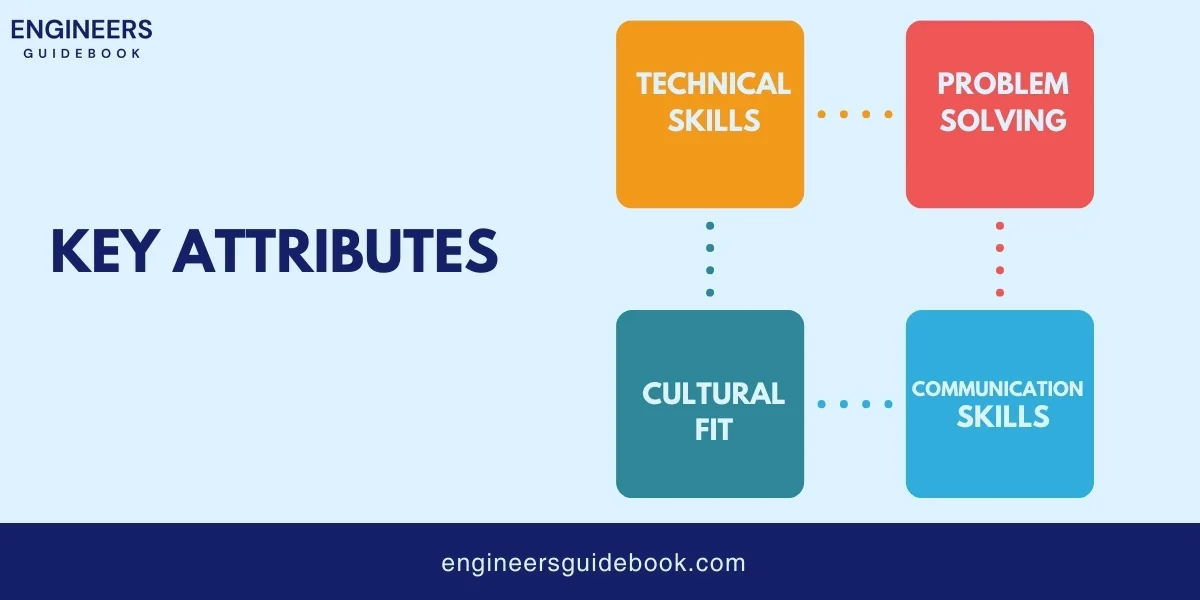
Learn about the company’s history. Find out When it was started and Important events that shaped it. Knowing this helps you understand the company better and shows you are interested.
Understand the company’s mission and values. Shows that you share these values during your interview.
During research list down the main products the company makes or the services they offer. This helps you understand what they do and how you can contribute.
Find out what technologies the company uses. Show that you are familiar with these technologies or eager to learn them.
Learn about the latest trends in the industry. This includes new technologies, customer preferences, and changes in the market. Show that you are up-to-date with these trends.
Read recent press releases about the company. These can include announcements about new products, partnerships, or achievements.
Find out about new product lines, research initiatives, or companies they have bought. Talking about these shows you are interested in the company’s future.
Review the key concepts in your field of engineering. For electrical engineers, this might include circuits and signals. Mechanical engineers should focus on mechanics and thermodynamics. Civil engineers need to understand structures and materials.
Understand the theories behind the formulas. Know how these theories apply to real-world problems. For instance, understand why Ohm’s Law is important in designing circuits.
Why Newton’s Laws of Motion are crucial for mechanical systems. This knowledge helps you explain your solutions clearly during interviews.
Be familiar with the tools commonly used in your field. For electrical engineers, this might include oscilloscopes and multimeters and software like MATLAB or SPICE.
Mechanical engineers should know about machining tools and software’s like SolidWorks or AutoCAD.
Software engineers should be comfortable with languages like Python, Java, and C++. Knowing these tools and software shows you are ready to work in a professional environment.
We have compiled a list of important behavioral questions that are commonly asked in interviews across various fields. Make sure to prepare thoughtful answers to these questions.
The STAR method is a structured approach to answering behavioral interview questions effectively. It stands for Situation, Task, Action, and Result. Here’s why we use it:
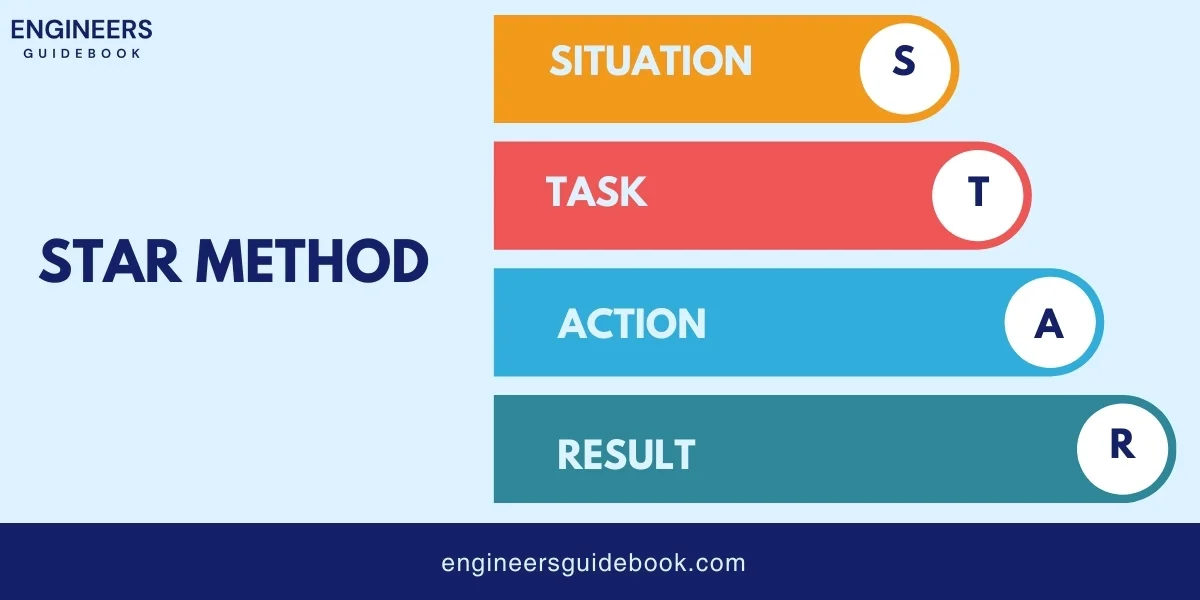
Start by describing the situation. Explain where you were and what was happening. For example, “At my previous job, we had a project with a very tight deadline.”
Next, explain the task you had to complete. What was your responsibility? For example, “I was responsible for organizing the team and ensuring we met our deadline.”
Describe the action you took to complete the task. What steps did you take? For example, “I scheduled regular meetings, broke tasks into smaller goals, and kept the team motivated.”
Finally, explain the result of your actions. What was the outcome? For example, “We completed the project on time, which was a big success with our client.
Show your technical projects in a portfolio. Include descriptions, images, and any papers that show your skills and what you’ve achieved.
Pick ones where you used skills like solving problems and team management. Focus on projects that fit the job you want.
Practice talking about your projects in a clear way. Explain what problem you fixed and how you did it. Use easy words and avoid tech talk unless they ask.
These tips will help you demonstrate your technical skills and impress people when you discuss your projects in interviews.
Find someone to help you practice mock interviews. This could be a teacher, a family member, or a friend. They can ask you questions like in a real interview.
Practice like it’s a real interview. Dress up and imagine you’re in a real job interview. This helps you feel more ready and confident.
After each mock interview, think about how you did. What went well and what could be better? This helps you improve.
Practice speaking clearly and using body language that shows confidence. Listen carefully to others and respond thoughtfully.
Talk about times when you worked well with others. Explain how you shared ideas and helped the team succeed.
Tell them you can handle many tasks at once. Organize your time so you can finish everything on time.
Tell them that you finish your work by the deadline. Please plan and stay focused to get things done when they’re due.
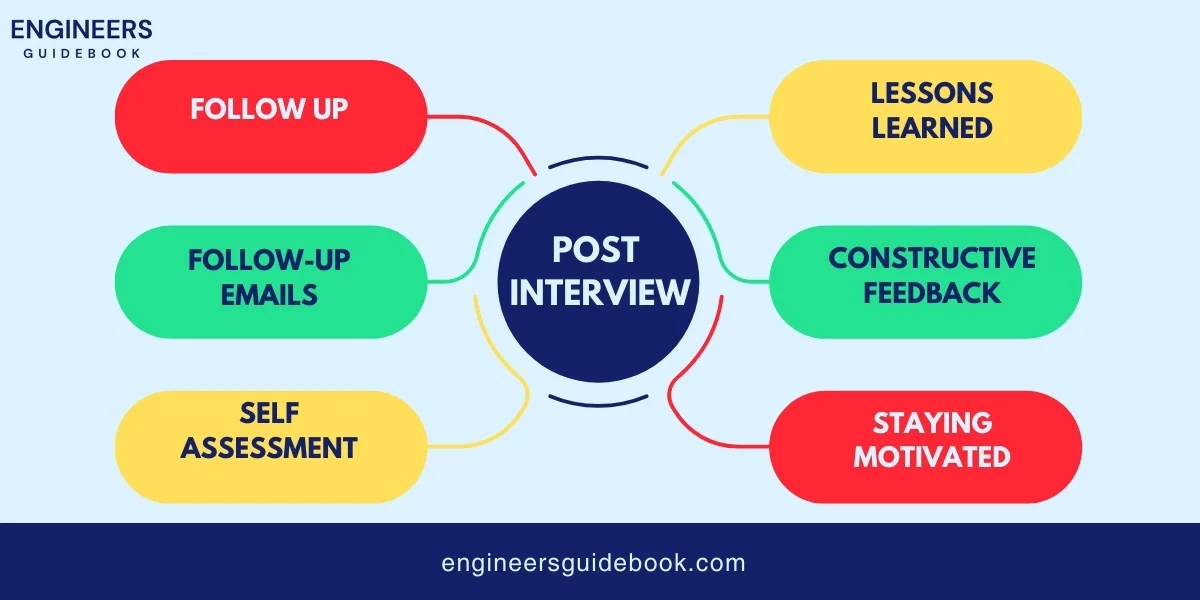
1. Follow-up: After your interview, send a thank-you note to show appreciation and reiterate your interest in the position.
2. Follow-up emails: If you haven’t heard back, send a polite email to check on the status of your application. It shows your continued interest.
3. Self-Assessment: Think about how the interview went. What did you do well, and what could you improve next time?
4. Lessons Learned: Learn from each interview experience to better prepare for future opportunities.
5. Constructive Feedback: If you receive feedback, use it positively to improve your skills and approach.
6. Staying Motivated: Stay positive and keep applying for jobs. Each interview is a chance to learn and grow.
In conclusion, preparing for engineering job interviews requires dedication and practice. By following the strategies outlined in this guide, such as mastering technical skills, practicing behavioral interview questions using the STAR method, showcasing your projects effectively, and utilizing post-interview strategy, you can significantly enhance your chances of success.
Remember, each interview is an opportunity to learn and grow. Reflect on your experiences, seek feedback, and continue refining your skills.
Start your preparation today with confidence and determination. With thorough preparation and persistence, you can achieve your career goals in engineering. Good luck!
There are five main types of interviews.
Employers assess candidates on four key areas: technical skills relevant to the job, problem-solving abilities, cultural fit within the company, and communication skills. They seek individuals who can apply their knowledge, tackle challenges creatively, work well with others, and effectively convey ideas.
These are the steps to be prepared for an interview.
A company’s mission is its primary purpose or goal – what it aims to achieve.
Company values are the core principles and beliefs that guide behaviour and decision-making within the organization.
The mission defines the ‘what’ and ‘why’, while values shape the ‘how’ of a company’s operations and culture.
The STAR method structures behavioural interview responses: Situation (context), Task (your responsibility), Action (steps taken), and Result (outcome). This approach helps you provide clear, concise examples of your skills and experiences to interviewers.
Send thank-you notes, follow up, self-assess, and learn from feedback. Stay motivated.
Success in engineering interviews requires mastering technical skills, using the STAR method, showcasing projects, and applying these strategies. Each interview offers growth opportunities.

Bilal Arshad, with a PhD in Mechanical Engineering from Caltech, specializes in robotics and automation. His cutting-edge research in autonomous systems is revolutionizing industrial manufacturing processes.
Explore the Engineer’s Guidebook! Find the latest engineering tips, industry insights, and creative projects. Get inspired and fuel your passion for engineering.
© 2023-2024 Engineer’s Guidebook. All rights reserved. Explore, Innovate, Engineer.